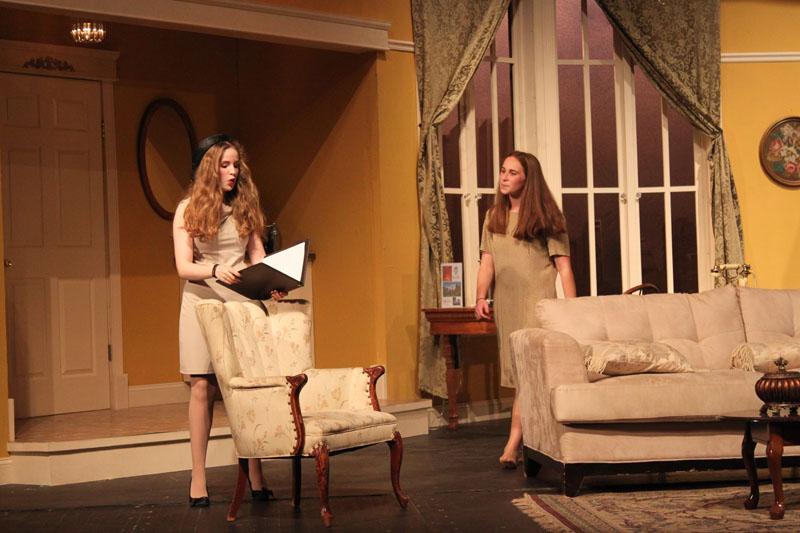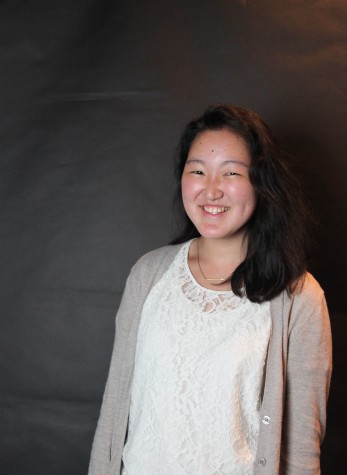Fall Play Review: “Plaza Suite”
November 8, 2014
Theatre Central is kicking off its year with the fall production of “Plaza Suite” by Neil Simon. The play includes three acts, each set in Room 719 of the Plaza Hotel in New York City.
Though advertised as a comedy during school announcements, the first two acts of the play seemed to be far from it.
In one, a husband and wife struggle with keeping their marriage intact, and in another, an unhappily married woman and her high school boyfriend meet after 17 years of not speaking. While these had the chance to be comedic, the issues that the characters tackled weren’t the type to elicit laughter from the audience. The actors portrayed their characters in a comedic way, creating a strange atmosphere around dialogue that should have been more emotional. Whether it was Mrs. Nash accusing her husband of having an affair or Muriel kissing Jesse even though she was married, the comedy wasn’t written into the lines. The mismatch between the acting and the writing created a bizarre tension in the audience, leaving us feeling uncomfortable as we watched the scenes unfold.
Not only was the interpretation of the dialogue unsettling, watching the actors play out overtly sexual themes with visible discomfort also left the audience feeling just as awkward. In the second act of the play, Muriel drives from New Jersey to New York City to meet her high school boyfriend, and the sexual tension that follows was almost tangibly painful to sit through. Lines were rushed and difficult to understand and the blocking exuded the unfamiliarity the actors had with this sort of theme. We aren’t blaming the actors completely for this: it’s understandable that teenage thespians wouldn’t be as nuanced in executing the types of themes usually reserved for more experienced actors and audiences. It seems, however, that they needed to be able to put aside their personal issues with the script and completely immerse themselves in their characters.
The actors used the tension to their advantage when the act intended to feel a little embarrassing. At the beginning of the act, Muriel feels she has no place being there, and when Jesse implores her to stay, their body language and inflection showed the emotions that were written into the play.
The quiet aggression written into the first act had the same issue. When Mr. and Mrs. Nash were arguing over the infidelity in their marriage, many of the lines were written to emanate understated anger, however, since the actors played the roles as if they were comedic, the emotion behind the words was lost.
In the moments when they were yelling, we could feel the rage that both of them felt in bringing all of their problems to light. We thought that they portrayed that part of the argument very well. However, losing the meaning behind the quieter dialogue made it feel like the argument was missing an important section.
Another issue with the first act was that the fight ended with no climax. While tension should have built throughout the twenty-odd minutes that the story unfolded the discussion ended abruptly. That might not be the actors’ fault, as that could have been in the writing, but it is also the actors’ jobs to take what they get and make the most of it. The first act wasn’t wholly lacking emotion, however. The passive-aggressive back-and-forth that preceded the altercation was expertly executed and built tension leading up to the argument in a way that had the audience engaged and on the edges of their seats when the dispute began.
The final act of “Plaza Suite” was, in our opinion, the best of the three. The comedy was apparent in this act, in which a mother and father are at their wits’ end when their daughter refuses to go down to the altar where her husband-to-be is waiting. The actors playing the parents had an on-stage chemistry that had the audience truly believing that they had been married for years and years. Whether they were rapid-fire bickering or delving into deeper issues behind the state of their marriage, the two actors really clicked and made the act that much more enjoyable.
We found ourselves laughing out loud at some sections of the act, seeing the father’s highly physical comedy or the hysterical antics of the mother. All in all, the third act was a perfect end to the play, leaving the audience light-hearted and thoroughly content with what they saw.
Some readers might perceive this review as negative, but we want to clarify that we did enjoy the play, particularly in the end. Seeing high school actors tackle themes beyond their understanding and doing it as masterfully as we could have hoped left us satisfied with the quality of the performances.
We whole-heartedly recommend that all Central students take the time out of their weekend to go support their classmates in Theatre Central by taking a trip to the Plaza Hotel.









